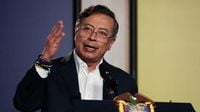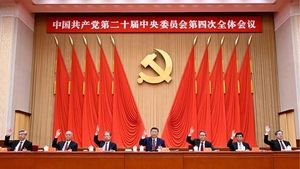In a move that has sent shockwaves through diplomatic circles across the Americas, the United States Department of the Treasury on Friday, October 24, 2025, announced sweeping sanctions against Colombian President Gustavo Petro, his wife, his son, and the country’s interior minister, Armando Benedetti. The decision, which accuses Petro and his inner circle of enabling Colombia’s booming cocaine trade and shielding criminal groups, marks a dramatic escalation in the already fraught relationship between Washington and Bogotá.
The Treasury’s action freezes any assets Petro, his family, and Benedetti may hold in the United States and bars all U.S. entities from doing business with them. Treasury Secretary Scott Bessent minced no words in his statement, declaring, “Since President Gustavo Petro came to power, cocaine production in Colombia has exploded to the highest rate in decades, flooding the United States and poisoning Americans.” According to the Treasury, these developments have unfolded under the banner of Petro’s so-called “Total Peace” plan—a controversial initiative aimed at ending Colombia’s six-decade internal conflict through negotiation with armed rebels and criminal organizations.
Petro, who has positioned himself as Colombia’s first left-wing president in modern history and is currently approaching the end of his term in 2026, was quick to respond. Taking to the social media platform X, he wrote, “Bernie Moreno’s threat has indeed been fulfilled. My wife, my children, and I have been placed on the OFAC [Office of Foreign Assets Control] list.” Petro went on to assert, “Fighting drug trafficking for decades—and doing so effectively—has brought me this measure from the government of the very society we helped so much to curb its cocaine consumption. Quite a paradox, but not one step back, and never on our knees.” He also pledged to contest the sanctions in U.S. courts, signaling that he would not back down in the face of mounting pressure.
Interior Minister Armando Benedetti, also targeted by the sanctions, echoed Petro’s defiance, framing the move as political retribution for supporting the president. “For the US, a nonviolent statement is the same as being a drug trafficker,” Benedetti posted online. “Gringos, go home.” Benedetti further insisted, “I have never entered the house of even a single drug trafficker.”
The sanctions come at a time when U.S.-Colombian relations are at a historic low. Traditionally, Colombia has been one of Washington’s most reliable partners in South America, especially in the fight against narcotics trafficking. The Biden administration even designated Colombia a “major non-NATO ally” in 2022. But since Donald Trump’s return to the White House on January 20, 2025, the relationship has deteriorated rapidly. According to CNN, the current standoff represents “the personalization of a bilateral crisis,” with the day-to-day cooperation between the two countries’ militaries and security forces still largely intact, but the leaders locked in a bitter feud.
The roots of this conflict run deep. Early in his second term, President Trump made good on campaign promises to crack down on undocumented immigration, leading to mass deportations that drew global condemnation. Petro, an outspoken critic of Trump’s approach, refused to accept two deportation flights from the U.S., prompting Trump to threaten harsh tariffs against Colombia. Petro ultimately relented, but the episode set the stage for ongoing clashes over immigration, human rights, and the drug trade.
Colombia remains the world’s largest source of coca, the raw material for cocaine. The United Nations reported last year that the country had seen its tenth consecutive year of increasing cocaine production, with a staggering 53 percent jump since Petro took office in 2022. The U.S. Treasury’s statement directly links this surge to Petro’s policies, claiming that he has “allowed drug cartels to flourish and refused to stop this activity.”
In response, Petro has repeatedly insisted that his administration has fought drug trafficking “effectively for decades.” He argues that the U.S. is scapegoating Colombia for America’s own drug consumption problems, and he has pointed to his “Total Peace” plan as a more humane alternative to the militarized approach of the past. However, critics in the U.S.—including Republican Senator Bernie Moreno—have long accused Petro of being soft on crime and too willing to negotiate with criminal groups.
The feud has not been confined to rhetoric. Since September 2, 2025, Trump has ordered a series of deadly missile strikes on vessels in the Caribbean Sea and the Pacific Ocean, targeting what the administration describes as drug traffickers. These attacks have resulted in at least 34 deaths, some of them Colombian nationals. Petro has condemned the strikes as extrajudicial killings, highlighting cases like that of fisherman Alejandro Carranza, who died in one of the bombings. “These are not war casualties,” Petro wrote on social media. “They are murders.”
Petro took his criticism to the international stage at the United Nations in September, telling the assembly, “The violent war on drugs was a failure, and I replaced it with an effective anti-trafficking policy. Was it really necessary to shoot missiles on unarmed poor young people in the Caribbean?” Shortly after, the Trump administration revoked Petro’s U.S. visa, citing his “reckless and incendiary actions.” The administration has previously compared Petro’s public demonstrations to “terrorism.”
The diplomatic rift deepened further when Trump announced on Truth Social that he would halt all U.S. aid to Colombia—the largest recipient of American funds in South America, receiving more than $743 million in fiscal year 2023. Trump has also threatened more direct intervention if Colombia does not stem the flow of cocaine. “Petro, a low rated and very unpopular leader, with a fresh mouth toward America, better close up these killing fields immediately, or the United States will close them up for him, and it won’t be done nicely,” Trump declared. He reiterated the threat days later, warning, “He’d better watch it, or we’ll take very serious action against him and his country.”
Petro, for his part, has threatened to sue Trump for slander, while his son Nicolas Petro denounced the sanctions as “political and judicial persecution without precedent.” Nicolas, who was arrested in Colombia in 2023 for money laundering and illicit enrichment, said he would “turn to international organizations to defend my rights.” The U.S. Treasury claims that Nicolas funneled money from drug traffickers into his father’s “Total Peace” efforts and election campaign—a charge Nicolas disputes, noting that Colombian prosecutors have found no link to the campaign or drug trafficking.
As the diplomatic crisis deepens, Colombia has recalled its ambassador from Washington, a symbolic move underscoring the gravity of the standoff. For now, the sanctions place Petro among a rare group of world leaders personally targeted by the U.S., including Venezuela’s Nicolas Maduro and Russia’s Vladimir Putin. The coming months are likely to test the resilience of Colombia’s institutions—and its long-standing alliance with the United States—like never before.






